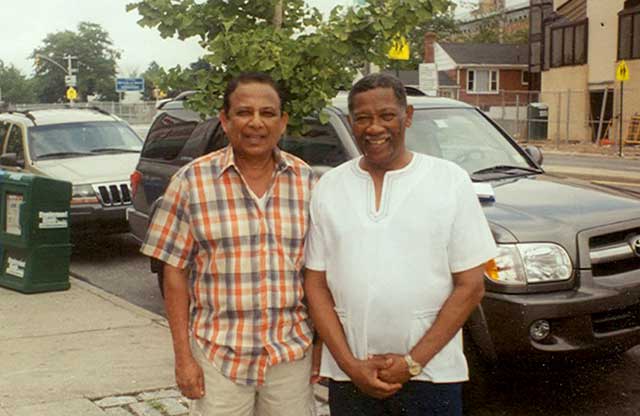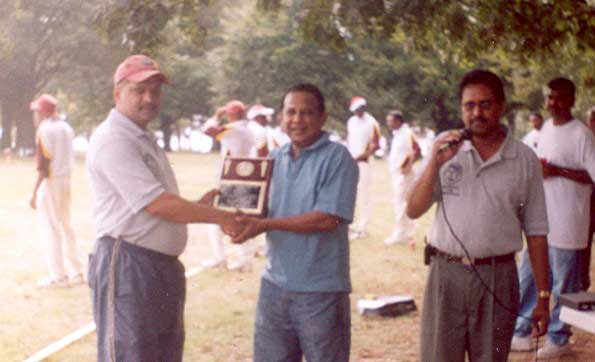
By Sam Sooppersaud
It is with a heaviness in my heart that I sit at my laptop to write my account of a Eulogy for Shan Razack, who passed away two weeks ago in Queens, NY at the age of 78. Out of respect for his memory, his religious beliefs, and consideration for his family, I waited until now to pen this article.
Who was Shan Razack? First, I would insist on saying that he was a gentleman, in addition to the other numerous accolades that are being heaped upon him, now that he’s gone.
From a very young age, he was a sportsman, playing several different sports. He was a sports organizer, even when still a young boy. He was a scholar, beginning at the elementary school level. He was a health facility administrator. Above all, he loved the vocation of cricket journalism. In the era when there were hardly any radios around; absolutely no television, only the printed media, Shan brought many cricket matches alive for cricket lovers, using his pen, paper, and typewriter. It was before the age of the computer. He was a journalist who lived up to his conviction. He wrote the way he felt about and saw things. Not one to write what he felt the readers wanted to read. If there were a topic that interested him, he would delve into it. He did his interviews, his research, and his investigation. Once he felt that he had enough facts on the topic, he would hit his typewriter. He practiced investigative journalism. He was a man of real conviction and character.
I must assure you the readers, that I feel qualified to pen this piece on Shan because I knew the man; the kind of person he was, even from a very young age. We lived in the same village, grew up together, went to school together, and immersed ourselves in sports together. We both lived in the Canje District of Berbice at Canefield: he at Old Canefield and me at Canefield Settlement. We both went to St. Patrick’s Anglican School (Elementary) and Berbice Educational Institute (Ramlochan High School). Shan was about three years older than I. But, in the mid-teens we were in the same peer group, doing things together, playing different sports together. A few of our friends whose names I remember were: Morris Sabsook, James and Everette Rodney, Sherlock Sukdeo, Ivor Liverpool (later an anesthesiologist), James Rose (later Vice-Chancellor of the University of Guyana), and numerous others, the names of whom I cannot remember.
Unlike today in the Canje District where kids ride bikes to school or take taxi cabs, we walked the dusty red-brick road to and from elementary school. Hey, there were hardly any bicycles around, anyway. Shan, being a few years older than I, was of course, in a higher standard (grade) than I was. But, we did several activities together with our other friends.
At St. Patrick’s Anglican School it was the practice to keep an assembly every Friday morning. All the pupils would be herded to the upper floor of the two-story school building. One of the exercises at the Friday assembly was the reading of the names of all the pupils who had earned academic excellence during the week. A kind of performance report. It seemed that the name Shan Razack was always on that call list. He was a smart kid in school!

When we were growing up, Guyana was then British Guiana, a Colony of Great Britain. Bookers Limited, a firm in Great Britain, owned and managed the sugar factories located throughout the coastal regions of the country. Our village was situated on lands owned by Rose Hall Sugar Estates, in Canje, Berbice. Almost all of the people who worked were employed by Rose Hall sugar estate. Bookers did not only make enormous profits from sugar, but they also poured money back into social and cultural programs to benefit the workers’ children. This they did through the Sugar Industry Labor Welfare Fund. (S.I.L.W.F.). Each sugar estate had a fully furnished and equipped “Welfare Centre.” The Centre was administered by a Welfare Officer, and programs at the center included games for boys and girls—table tennis, volleyball, lawn tennis, soccer (football), and of course, cricket. Other activities included sewing classes, cooking and baking classes, a library, and other social/cultural programs
After school, the kids went to the Centre and engaged in various activities. Shan loved to play table tennis, lawn tennis, volleyball, and cricket. But cricket was his favorite of all the other sports. He was a bowler; a right-arm wrist spinner, serving up leg-breaks. From a very young age, he was darn good at bowling his leggies. Man, could he turn that cricket ball! He sure could! We played on the Rose Hall Welfare Center Boys’ Club team. We also represented St. Patrick’s Anglican School in the elementary school cricket competition, though at different times. Many a young batsman fell to his leg-breaks which once pitched outside the leg-stump would careen almost “square” onto the stumps. Some of our friends in those times are still around today.
Unlike many of us friends, Shan did not continue his cricket as he grew older. However, he remained connected to cricket, but in a different capacity. The Welfare Centre library had an extensive collection of books on the sport of cricket—on coaching and the history of the game. Shan was always reading those cricket books and thus fell in love with the journalism part of cricket. He was the one to do the scoring in Boys’ Club cricket games. Shan made tedious notes and after the games would prepare a report for the Welfare Officer. He did the same when our high school played a cricket game. Shan Razack would be the one to get up on stage Monday morning after the game and give a full and detailed report of what went on in the game. It was astonishing to see the details with which he made his written and verbal report. He was stuck on cricket journalism from very young. He was an excellent organizer, also. Whatever game you needed to organize, and against whatever opponent, Shan would get the schedule done.
After we finished our exams, we set out on our various jobs and vocations. I joined the British Guiana Police Force, Ivor Liverpool left to study in the States, James went to further his studies in “town,” and many went into the trades. Shan passed several subjects in the General Certificate of Examinations with honors, I must add. He took up employment with the Public Hospital in New Amsterdam, and due to his brilliance exhibited on the job, he received several promotions. Within a short time, he was elevated to the prestigious post of Hospital Administrator and oversaw the entire workings and workforce of the facility.
The mental hospital In New Amsterdam at the time was situated at Fort Canje, and Shan was transferred to the Mental Hospital, NA, to oversee some much-needed changes. He was appointed the Administrator of that institution and remained at that job until the time that he migrated to the United States. Shan took his love of cricket to the Mental Hospital, NA. He helped build one of the most competitive cricket teams that the Mental Hospital ever had. The team competed in the Davson Cup, Berbice’s First Division cricket competition. By this time Shan was a featured cricket writer in the Berbice Times, the Guiana Graphic, and the Daily Chronicle. Excerpts of his articles were frequently used by the famous sportscaster, B.L. Crombie in his nightly sports news broadcasts. As a journalist, Shan covered all the “big” games that were played in British Guiana (Guyana), from Test cricket to Shell Shield cricket (an inter-Colonial cricket tournament)
As I mentioned above, Shan was a fearless writer. He wrote his conviction and precisely the way he saw things. But, one trait the avid writer possessed was, not to write on impulse. He always researched his topic. If there were a rumor in the cricketing fraternity, he would peek and seek, and prod, and question. He wanted to know that whatever he gave his readers, was authentic, substantiated news. He was very much respected among his peers and other cricket writers in the Caribbean, as well as cricketers. He was fair to all in his writings.
Shan moved to the U.S.A. a few decades ago and settled in New York City. Of course, he immediately immersed himself in the cricket life in New York City, attending games and writing extensively on each game that he watched. Shan did not shy away from cricket controversy, he addressed them and did his best to help alleviate volatile situations. As long as there were facts to support his theory, Shan would put it down on paper.
About the time he came to New York City, he met with and befriended Ralph Tamesh, the president of the Indo-Caribbean Federation (I.C.F.). The relationship between them became a strong one. Shan began writing articles to be published in the I.C.F. magazine. He also wrote articles for several New York City weekly publications. By this time, I had started “dabbling” in some cricket journalism myself. Shan and I collaborated on numerous articles. In as much as I knew the man from boyhood and his various qualities, his brilliance never ceased to amaze me. His quick-wittedness, his sense of reasoning, and his ability to “see” other people’s viewpoint, although they were completely the opposite of his. A true gentleman!
May He Rest In God’s Holy Peace!



